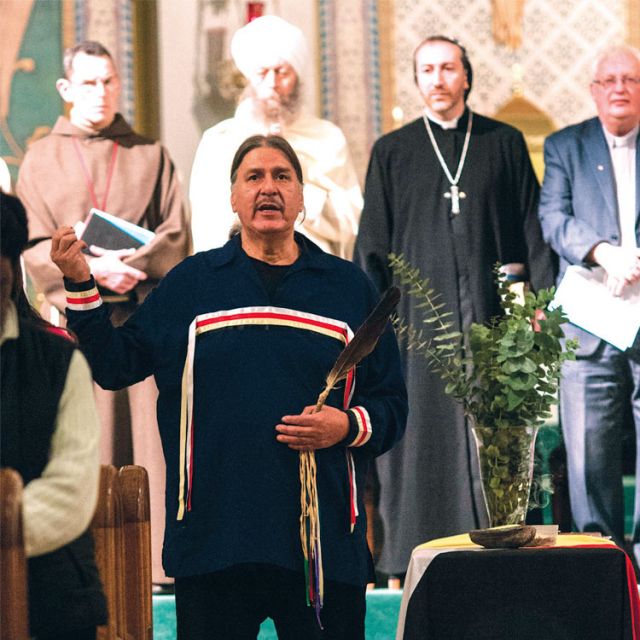At St. Paul’s Basilica it wasn’t just Christians but the widest range of religious leaders ever gathered in the city who came together to pray for Christians and others persecuted for their faith Nov. 10. From Muslims to Zoroastrians, Protestants to Jews, Hindus to Orthodox, people of divergent faiths came together to offer prayers.
“Those who are in prisons or dungeons, those who are in exile or captivity, and those who are held in bitter bondage, O Lord, set them all free and have mercy upon them,” Coptic Orthodox Fr. Ammonius Guirguis prayed from the ancient Litany for the Sick and All Those Who Are In Distress. “For You are He who loosens the bound and uplifts the fallen; the hope of those who have no hope and the help of those who have no helper.”
In Egypt Coptic Christians — Othodox and Catholic — have endured mob attacks on churches, monasteries, schools and Christian-owned businesses since the ouster of former President Mohammed Morsi in July.
First Narayever Congregation Rabbi Edward Elkin read from Libi Astair’s recollection of Chanukah in the Nazi death camp of Bergen Belsen. The story asks how Jews could honestly pray the line from Proverbs 20: 27, “The candle of God is the soul of man,” while they are surrounded by death.
“After being privileged to see with my own eyes that the faith and the fervour of the Jewish people still live — despite all that we have endured — how can I not thank God for keeping me alive to see this time?” asked the rabbi who lead the Chanakah service for Bergen Belsen inmates.
For Syriac Orthodox pastor of St. Barsumo Church Fr. Estephanos Issa, the most appropriate words for the occasion were from St. Paul’s Second Letter to the Corinthians.
“We are afflicted in every way, but not crushed; perplexed but not forsaken; struck down, but not destroyed; always carrying in the body the death of Jesus, so that the life of Jesus may also be made visible in our bodies.”
Canadians are only now becoming aware of what Christians face in Syria, and they still don’t know the extent of persecution, Issa said.
“If only they would know the full truth,” said Issa. “They know it’s bad in Syria, but I don’t think they know how bad.”
Reliable statistics on Christian persecution are hard to come by. A 2012 Pew Forum study found that Christians faced everything from harassment to violent persecution in 139 countries between 2006 and 2010. The Centre for the Study of Global Christianity in Boston estimates an average of 100,000 Christians per year are killed “in a situation of witness.” That figure is disputed as counting many caught in violent conflicts who just happen to be Christian. At the low end Evangelical scholar Thomas Schirrmacher estimates 20 Christian fatalities every day for a total of 7,300 per year.
The world’s largest religion with 2.3 billion adherents is also the world’s most persecuted religion. Most Christians, about two-thirds, live in poor and violent parts of the world — Africa, Latin America, Asia and the Middle East.
The prayer service at St. Paul’s attracted a sparse Sunday afternoon crowd. As long as specific incidents of religious persecution are not dominating headlines it’s hard to get people motivated, said archdiocese of Toronto ecumenical and interfaith director Fr. Damian MacPherson. The fact that religious leaders from almost every significant faith in the city recognize that religious persecution is a real issue — real enough to demand their time and prayers — is significant, he said.


